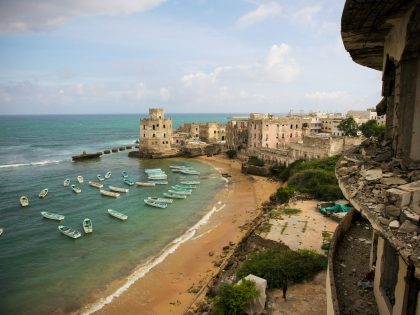
What happened to Ethiopia?
The ongoing displacement and killings of minorities and the ongoing war in Tigray—labeled by the federal government as enforcing law and order—are disturbing. It can't go on.

The ongoing displacement and killings of minorities and the ongoing war in Tigray—labeled by the federal government as enforcing law and order—are disturbing. It can't go on.

The Indigenous people of the Tibesti mountain range that straddles northern Chad and Libya have been neglected and stigmatized by the elites who control and favor development of the south.

African states are involved in the War on Terror more than we think. They're surrounded by an eco-system of the war industry.

Dieudo Hamadi’s film 'Downstream to Kinshasa' is a powerful antidote to the DRC's collective amnesia around the Six-Day War and its aftermath.

Amilcar Cabral is a household name. But what happened to the young women like Joana Gomes who helped lead Guinea Bissau’s independence struggle?

Exploring the different neighborhoods within Mogadishu raises the question: who is this city really for?

Recent changes affect the daily lives of ex-combatants and other soldiers who struggle to reintegrate into society a decade after the end of the war.

The current political conflict, now a civil war, in Ethiopia partly has its roots in disagreement among elites on how to narrativize Ethiopian history.

How Rwandan history is told—and who does the telling—is important as it determines who is able to participate in conversations about the past.

The imminent and existential danger to Ethiopia is not Abiy Ahmed and an oppressive government. It is violent ethno-nationalism.

What does the decade-old “Congo-case,” involving two Norwegian mercenaries, tell us about residue coloniality in Scandinavia?

The Liberian academic and writer talks about citizenship, belonging, and what unites her fragmented nation.

Because of the 1994 genocide, Rwanda occupies a complicated place in the world’s imagination. A new film, about the preceding 1973 pogrom, wants to demystify that view. Does it succeed?

The United States’ military operations in Somalia are not well known because they'e carried out secretly or via proxies. COVID-19 hasn't slowed them down.

The climate crisis, resource extraction, and the insurgency by a group claiming affiliation to ISIL in Mozambique’s Cabo Delgado province.

Are the international community and the African Union really powerless to stop the fratricidal war in Cameroon, or are they just indifferent?

The use of a singular narrative to explain the divisions within Cameroon belies the reality that both anglophones and francophones are complicit in the conflict.

The French philosopher and TV personality favors spectacle over analysis. The result: we don't make sense of political violence in Nigeria.

War, peace, and cooperation among herder-farmers in northeastern Uganda.

A new film about Kony 2012 is a lesson in how not to fight simplification with more simplification.